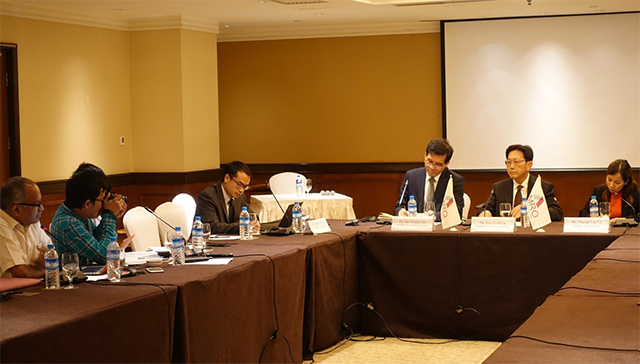
AMRO Chief Economist Dr Hoe Ee Khor (second from right) and Lead Economist Dr Jae Young Lee (third from right) briefed a group of journalists on AMRO’s 2018 Annual Consultation Report on Myanmar on October 05, 2018 in Yangon.
SINGAPORE, Oct 10, 2018 – The Myanmar’s economy grew by 6.8 percent in FY2017/18 and is expected to expand 7.4 percent in the new FY2018/19 starting on October 1, supported by sustained foreign direct investment inflows, improving investor sentiment, and continuing strong growth in garment exports and domestic consumption. This was highlighed by the ASEAN+3 Macroeconomic Research Office at the press conference in Yangon on October 5, following the publication of its 2018 Annual Consultation Report on Myanmar last month.
At the first press conference on a country report held in a member country, AMRO Chief Economist Dr Hoe Ee Khor and Lead Economist Dr Jae Young Lee joined a dozen of Yangon-based journalists from both international and local media to discuss recent developments, prospects, challenges, and policy discussion on Myanmar’s economy.
Myanmar’s economy was on a gradual recovery path in Fiscal Year (FY) 2017/18 driven by expanding public spending and exports, after slowing down in the previous year. Inflation moderated further mainly due to lower food inflation, while core inflation started to pick up in the later part of the fiscal year. On the external front, the trade deficit improved in FY2017/18 on the back of stronger export growth and the foreign reserves increased modestly from the previous year. The risks to growth emanate mainly from ongoing ethnic tensions in Rakhine State and uncertainties in the global environment related to trade and energy prices. Exchange rate pressure and weather conditions that lead to supply-side disruptions will continue to be key sources of inflation uncertainty.
Going forward, enhancing tax revenue and containing current expenditure are critical to strengthening the fiscal position. The implementation of new banking regulations will enhance the soundness and resilience of the financial system and contribute to developing a healthier banking sector over the medium term.
At the press conference, AMRO also shared about the development of the regional financing arrangement, the Chiang Mai Initiative Multilateralisation (CMIM), a multilateral currency swap arrangement among ASEAN+3 members, and AMRO’s support to the CMIM. The CMIM’s core objectives are to address the balance of payment and short-term liquidity difficulties in the region, and supplement existing international financial arrangements.
The press conference is part of AMRO’s ongoing efforts to disseminate its views on the economy more widely within the country in order to enhance its transparency, credibility, and visibility in the region. Although the press conference was conducted in English, the report was translated into Myanmese language and the press conference was reported in the local language newspapers and dubbed into local language on video for the general public. AMRO also met with a group local businessmen and bankers, academics and officials from donor agencies to discuss the report.
—
The ASEAN+3 Macroeconomic Research Office (AMRO) is an international organization, established to contribute to securing the economic and financial stability of the ASEAN+3 region, which includes 10 members of the Association of Southeast Asian Nations (ASEAN) and China; Hong Kong, China; Japan; and Korea. AMRO fulfills its mandate by conducting regional macroeconomic surveillance, supporting the implementation of the Chiang Mai Initiative Multilateralisation (CMIM), and providing technical assistance to its members.
